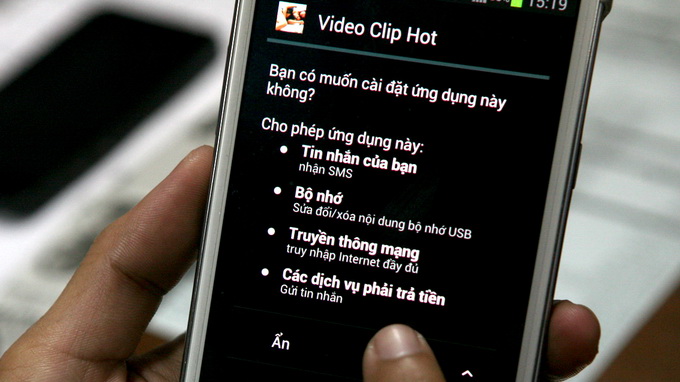N.T. usually ignores spam messages that lure him to visit websites with sexual content, but one day he gave in and clicked one of the seductive links, which bore a bitter fruit.
T., who lives in Ho Chi Minh City’s District 11, said he has repeatedly been disturbed by spam SMS messages that invite him to watch lewd video clips online.
“Once, I clicked the link out of curiosity, and was directed to an ad website,” T. recalled.
His phone account has since been automatically deducted even when he does not use it to text or talk, while his 3G service has been suspended, he said.
“After several days of observation, I noticed that my account loses VND15,000 every day,” he said.
T. is a victim of a new kind of smartphone scam as his handset has been infected by a hidden and malicious app that automatically sends messages without his knowledge.
This scam can also include software that can steal personal and important information from smartphone users and transmit it to hackers.
In order to get users to click on links to malicious websites from which harmful apps are downloaded and installed, scammers send seductive messages, such as promising the leaked sex tape of a local celebrity.
Nguyen Xuan Thanh, chief of digital content at Vien Thong A Co, said Android-powered smartphones are most vulnerable to this kind of scam.
The malicious apps either fake the name of popular apps and games, or are disguised with erotic names like Porn Movie or Sex Photo, Thanh said.
These apps have been removed from CH Play, the official app market of Google, but are still spread among smartphone forums, he added.
“There are websites such as dj.tuoigi.com, dj.kenh74.com, and dj.lak.vn which will automatically send setup files to users’ smartphones, and if these files are installed, the devices will be infected with the auto-messaging apps,” he warned.
Hard to detect
Nguyen Minh Duc, deputy chairman of Internet security at BKAV, a security firm, said scammers are taking advantage of local users’ habits of using free software to spread the malicious apps.
“The scammers offer the apps for free to attract users, and later, steal money from their accounts,” he said.
Duc said it is easy to program the code to secretly send the messages that will cost the smartphone users VND10,000 – VND15,000 each day, but detecting these apps is not so simple.
Meanwhile, Thanh from Vien Thong A advised users to only download and install apps from authentic sources like CH Play for Android devices, and iStore for iOS users.
“Smartphone users should also delete all files that are automatically downloaded to their devices as these contain malicious apps,” he added.





















































